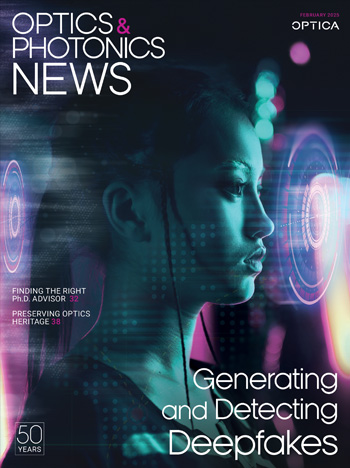
November 2011 Issue
Feature Articles
Optical Innovations in the James Webb Space Telescope
The team building the next big space observatory is using a surprising number of optical innovations—including the technique that helped fix the Hubble Space Telescope.
by Patricia DaukantasKeeping It Together with Laser Welding
Laser welding is faster and cheaper than conventional joining technology, and it may even lead to lower greenhouse-gas emissions. Although laser welding is by no means easy to do, technological advances are making it an increasingly viable option within various industries, including transportation, electronics and sensing.
by Breck HitzSpontaneous Parametric Processes in Modern Optics
Spontaneous parametric processes have proved to be integral to the advancement of quantum information science. Their incredible versatility, in terms of the emission properties of entangled photons, allows for nearly unimaginable applications in the transmission and processing of quantum information.
by Hector Cruz-Ramirez, Roberto Ramirez-Alarcon, Maria Corona, Karina Garay-Palmett and Alfred B. U’RenLudwig Boltzmann A Pioneer in Atomic Theory
Ludwig Boltzmann’s pioneering work in atomic-molecular kinetics, statistical mechanics and thermodynamics bridged the gap between Maxwell’s classical physics of the 19th century and the quantum era ushered in by Planck and Einstein.
by Barry R. MastersDepartments and Columns
The Art of Seeing: Educating Kids with Partial Vision
Educating young children with partial vision presents a special set of challenges. The Nicolaus Copernicus University OSA student chapter in Poland rose to the occasion by developing a national contest to design optical toys geared toward kids with significant visual impairment.
The Violet Ray: A Handful of Lightning to Cure What Ails You
Promoters of the first Civil War-era medical electrical generators claimed that applying an electric current to the body would fix whatever ailed you. Although most health benefits have been dismissed as quackery, the technology has a legitimate yet minor role in scientific research.
Winning Images
Results from OPN’s sixth annual After Image photo contest.
Fabricating Aspherical Lenses
Although aspherical lenses are essential to many optical systems, their manufacture is notoriously complicated. Here, Oliver Fähnle from FISBA OPTIK AG shares his views on aspherical lens fabrication and the methods his lab applies in order to achieve optimum results with minimal slope and shape errors.
Australian Senator Advocates National Broadband Plan
Australian Senator Stephen Conroy was recently named as OSA’s 2011 Advocate of Optics. He was chosen for his work in championing a National Broadband Network for Australia that will establish fiber optic communications directly to 93 percent of Australian homes, schools and businesses.
Imaging Living Organisms with Sheets of Light
Caltech researchers developed a type of microscopy that simultaneously achieves high resolution, penetration depth and imaging speed, filling biologists’ need for fast 3-D imaging methods of organisms that don’t perturb the sample.
“Cakes” of Carbon Nanotubes Could Measure Terahertz Power
NIST researchers created arrays of extra-long carbon nanotubes that absorb virtually all radiation at these wavelengths—an important step in designing appropriate radiometric detectors.
Making Materials with No Phase Delay
By stacking alternating layers of an engineered negative-refractive-index photonic crystal and positive-index material, researchers built a structure with an average refractive index of zero in the near infrared.
Tiny Camera Captures Images without Lenses
Researchers at Cornell University have developed a tiny electronic camera that captures images without using lenses to focus the incoming light.

![Illustration of a synapse in the brain. [Getty Images]](https://opnmedia.blob.core.windows.net/$web/opn/media/images/articles/2025/0425/departments/202504-cover-web.jpg?ext=.jpg)
![Fiber draped around a hand, demonstrating its flexibility. [Photo by Z. Wang and L. Wei]](https://opnmedia.blob.core.windows.net/$web/opn/media/images/articles/2025/0325/departments/202503-cover-web.jpg?ext=.jpg)
